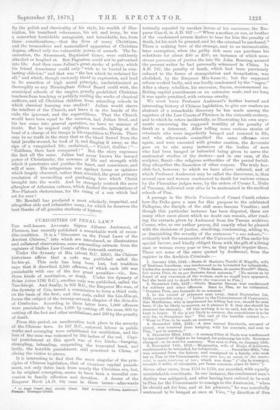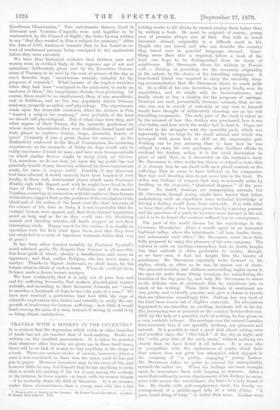CURIOSITIES OF PENAL LAW.* Tux well-known Avvocato Signor Alfonso Andreozzi,
of Florence, has recently published a remarkable work of recon- dite erudition. It is a "Discourse on the Penal Laws of the Ancient Chinese," into which are introduced, as illustrations and collateral observations, some astounding extracts from the registers of Italian Law Courts of the sixteenth century.
Under the dynasty of Ilm (about B.C. 2205), the Chinese historians affirm that a code was published called the Iu-hin-pi. This code has long been lost, but tradition says that it described 2,500 offences, of which each 500 was punishable with one of the five great penalties—viz., fine, three kinds of mutilation, or death. Under the dynasty of Mau (circa 1783 B.C.), another code was published, called the Tan-hin-pi. And finally, in 952 B. the Emperor Mo-wan, of the dynasty of Ceu, issued a commiseion to form a third code, on the basis of the first; and this code, called the Lin-Hin-pi, forms the subject of the twenty-seventh chapter of the Seitc-kin of Confucius. According to these latter laws, 1,000 offences were punishable by fine, 1,000 b. y cutting off the nose, 800 by cutting off the feet and other mutilations, and 200 by the penalty of death.
From this period, an amelioration took place in the severity of the Chinese laws. In 167 B.C., enforced labour in public works and scourging were substituted for mutilation, and the loss of the LOW was redeemed by 300 lashes of the rod. Capi- tal punishment at this epoch .was of five kinds,—hanging, strangling, beheading, suspending the truncated head, and lastly, the horrible punishment, still practised in China, of slicing the victim to pieces.
It is interesting to find that the most singular of the prin- ciples of Chinese legislation, that of vicarious capital punish- ment, not only dates back from nearly the Christian era, but, in its original conception, seems to have been a merciful con- cession to family affection and devotion. A decree of the Emperor Ho-ti (A.D. 94) runs in these terms—afterwexds
* Lepri Peron dews ARUM etrolet. Deli' Arroosto Alfonso Andrews!.
maim; Giuseppe 0Iveili. textually repealed by another decree of his successor, the Em- peror Gan-ti, in A.D. 107 :—" When a mother, or son, or brother of the condemned person desires to bear for him the penalty of death, let his wish be granted, and let the criminal be pardoned.' There is nothing here of the strange, and to us inconceivable, later corruption, when the guilty rich man can purchase his substitute for about £40 or £50; an instance of which mon- stroue perversion of justice the late Sir John Bowling assured the present writer he had personally witnessed in China. In A.D. 747, the penalty of death, which had been previously
reduced to the forms of strangulation and decapitation, was abolished, by the Emperor Min-huan-ti ; but the supposed reform worked badly, and was loudly condemned by the "sages."
After a sharp rebellion, his successor, Swum recommenced in.. flicting capital punishment on an extensive scale, and ere long it was again practised, with extreme cruelty.
We must leave Professor Andreozzi's further learned and interesting history of Chinese legislation, to give our readers an abstract of a remarkable discovery he has made among the registers of the Law Courts of Florence in the sixteenth century, and to which he refers incidentally, as illustrating his own argu- ments concerning the supposed inutility of the penalty of death as a deterrent. After telling some curious stories of criminals who were imperfectly hanged and restored to life, and who afterwards committed the same offenses over again, and were executed with greater caution, the Avvocato goes on to cite many instances of the bodies of men who had been hanged or beheaded being given to serve the anatomical studies of the doctors—and in one case, of the sculptor, Banti—the religious authorities of the period forbid- ding altogether the dissection of other corpses. The truly hor-
rible fact, however, to which we have above referred, and of which Professor Andreozzi may be called the discoverer, is, that several men and women Condemned to death for various crimes by the Florentine judges were, by the orders of Cosmo I., Duke of Tuscany, delivered over alive to be anatomised in the medical schools of Pisa.
A passage in the :Stork Universals of Cesari Cant a relates
how the Duke gave a man for this purpose to the celebrated Fallopius, the disciple of the still more famous Vesalius ; and though this particular instance has been disputed, there are many other cases about which no doubt can remain, after read- ing the extracts given by Andreozzi from the Tuscan archives. Cosmo, who, as our author proves, did exactly what he pleased with the decisions of justice, absolving, condemning, adding to,
or diminishing the severity of the sentences "a suo talonto,"— evidently took the anatomists of the University of Pisa under his special favour, and kindly obliged them with the gift of a living man or woman every year or two, as they might require them. These are some of the cases quoted by Andreozzi, from the
register in the Archivio Criminale :—
1. January 15th, 1545.—Santa di Mariotto Tarchi di Mugello, wife of Bastiano Lucchese, was condemned to be beheaded for infanticide. Under the sentence is written, "Dicta Santa, de mente Exoohlmt. Dneis, fuit missa Pisis, do ea per doctores fieret notomia." [No uotioe to be found of any execution of the woman, such as would have appeared, had she been put to death before she was sent to Pisa.]
2. December 14th, 1547.--Ginlio Mancini %nese was condemned for robbery and other offences. Sent to Pisa, to be vivisected. " Ducatur Pisis, pro faciendo de eo notomia." 3. In the record of prisoners sent away, dated September 1st, 1551, occurs this entry :—" Letter to the Commissioner of Castrocaro, that Maddalena, who is imprisoned for killing her son, should be sent here, if she be likely to recover, as it pleases S. E. that she should be reserved for anatomy. Of this nothing is to be said, bat she is to be kept in hopes. If she is not likely to recover, the executioner is to be sent for, to decapitate her." The end of the horrible extract is,— " Went to Pisa, to be made an anatomy."
4. December 12th, 1552.--A man named Zuccheria, accused of piracy, was reserved from hanging, with his comrade, and sent to Pisa, "per is notomia." 6. December 22nd, 1562.—A certain Ulivo di Paolo was condemned by the Council of Eight to be hanged, for poisoning his wife. Sentence changed—to be sent for anatomy. Was sent to Pisa, on January 18th. 6. November 14th, 1553.—Marguerita, wife of Biajio d' Antinoro,
condemned to be beheaded, for infanticide .. December 20th, "she was released from the fetters, and consigned to a family, who took her to Pisa to the Commissario, who gave her, as lomat, to the anato- mist, to make anatomy of her; which was done" (" elm In consegni, second() hi solito, al notomista, per fame notomia, come fu fatto").
Seven other cases, from 1554 to 1570, are recorded, with equally unmistakable exactitude. In one instance, the condemned man's destiny was mitigated, and after having been ordered to be sent to Pisa for the Commissario to consign to the Anatomist, "when he should ask for him, and at his pleasure," he was mercifully sentenced to be hanged at once at Vico, "by direction of Sue,.
Eeeellenza Illustrissima." Two unfortunate thieves, Paoli di Giovanni and Vestrino d'Agnolo, were sent together to be anatomised, by the Council of Eight; the Duke having written to say "that they wanted in Pisa a subject for anatomy." After the date of 1570, Andreozzi remarks that he has found no re- cord of condemned persons being consigned to the anatomists before they were executed.
We have thus historical evidence that thirteen men and women were, in civilised Italy, in the supreme age of art and splendour, deliberately given over by the Executive Govern- ment of Tuscany to be used by the men of science of the day as .oues describe dogs, "carnivorous animals, valuable for the purposes of research." What became of the hapless wretches when they had been "consigned to the anatomist, to make an anatomy of them," the imagination shrinks from picturing. Of course, there could be no employment, then, of any ancesthetic, real or fictitious, and no line was popularly drawn between anatomy, properly so-called, and physiology. The experiments made upon the miserable creatures, when the doctors in Pisa "wanted a subject for anatomy," were probably of the kind we should call physiological. But of what class were they, and what organs of their frames, did the scientific gentlemen (in whose secret laboratories they were doubtless bound hand and foot) please to explore,—brains, lungs, stomachs, hearts, or eyes ? Certainly it was a great chance for science ! As Dr. Rutherford confessed to the Royal Commission, his torturing experiments on the stomachs of thirty-six dogs would only be really conclusive if tried on man ; and here wore human entrails on which similar devices might be freely tried, ad /ibibon. Yet, somehow, we do not hear (at least the lay public has not generally heard) of any discovery achieved by these experiments made, for once, in corpore nob iii. Possibly, if any discovery had been effected, it would scarcely have been boasted of very loudly, in these toft, sentimental times, which make Professor Huxley sigh with disgust, and wish he might have lived in the days of Harvey. The names of Fallopius and of his master Vesalius, occurring in connection with the earlier of these human vivisections, suggest that, as the problems of the circulation of the blood and of the action of the heart were the chief interests of the science of the time in Italy, it is not improbable that the victims' breasts were opened, and that their learned inquisitors pried as long and as far as they could into the throbbing muscle and bleeding arteries, till death stopped at last their interesting study. Happy was it for the victims if so deadly an operation were the first tried upon them, and that they were not subjected to a score of ingenious torments before that coup de grace!
It has been often boasted (notably by Professor Tyndall's much admired guide, Dr. Draper) that Science is all-merciful, free from guilt of blood ; always a benefactress, and never an oppressor ; and that, unlike Religion, she has never made a martyr. Thanks to Signor Andreozzi, we shall know, for the future, what to think of such a boast. When she could get them, Science made a dozen human martyrs.
We hear continually that it is only out of pure love and seal for suffering humanity that modern physiologists torture animals, and according to their favourite formula, are "ready to sacrifice a hecatomb of dogs, to save the pain of a man." We have now received a portentous hint how little the rage of scientific exploration into brains and entrails, is really the out- growth of tenderness for human suffering,—how little it would heed causing the pain of a man, instead of saving it, could it by BO doing obtain satisfaction.



































 Previous page
Previous page